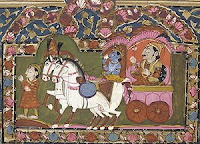 So I'm reading the Bhagavad Gita because it's one of the texts studied during yoga teacher training. And since I intend to pursue training one day, I'm preparing.
So I'm reading the Bhagavad Gita because it's one of the texts studied during yoga teacher training. And since I intend to pursue training one day, I'm preparing.The reason that I'm sharing this with you now is that I read some verses last night that finally explained something to me.
You see, I have encountered more than one Buddhist who possesses as enormous ego, fabricates the most fantastic lies, and behaves in ways that are destructive to both themselves and others. I may not be the most studied Buddhist-in-training, but from what I've learned from teachers like Pema Chodron, Thich Nhat Hanh, and Jon Kabat-Zinn, the behaviour of the above-mentioned individuals is decidedly un-Buddhist.
Interestingly, both Buddhists in question have cited the concept of "the divine within one's self" as a keystone of their beliefs. In my mind, these persons are basically using Buddhism to justify their own self-centredness.

I just don't t understand how the concepts of Buddhism could co-exist alongside such egotism. And then I came across a passage in the Bhagavad Gita last night (right) that showed me how these individuals were circumventing the paradox.
If I understand this correctly, I do believe that the Buddhists to which I refer read this passage and came to believe that meditation and yoga are expiatory acts that cancel whatever nonsense they provoke in their day-to-day lives.
This seems appalling to me, because (a) they are picking and choosing when to practice Buddhism, and (b) they are isolating which Buddhist precepts they wish to apply. It's like show-and-pony-Buddhism.
Is it me, or is this totally against the purpose and thrust of Buddhism? Help. Anyone?




No comments:
Post a Comment